Building resilience is essential for navigating life’s challenges with strength and confidence. By incorporating resilience biohacks into your daily routine, you can enhance your physical and mental toughness. From nutrition strategies and physical activity to mindfulness and sleep improvements, small changes can make a significant difference. These proven tips help you develop a resilient mindset, empowering you to bounce back faster and stay focused on your goals. Embrace these practical resilience biohacks and create a more resilient, vibrant life starting today.
Understanding Resilience and Why It Matters
Resilience is the cornerstone of overall well-being, enabling us to bounce back from life’s inevitable challenges and setbacks. At its core, resilience is the ability to adapt, recover, and grow stronger in the face of adversity. Whether it’s dealing with stress, health issues, or unexpected disruptions, resilience helps us maintain a balanced mindset and physical health.
Why does resilience matter? For starters, resilient individuals tend to experience lower levels of stress and anxiety, which can have long-term benefits for heart health, immune function, and mental clarity. Moreover, resilience fosters a growth mindset—viewing obstacles as opportunities rather than insurmountable barriers—making it easier to pursue personal goals and maintain motivation.
In today’s fast-paced world, cultivating resilience has become more crucial than ever. By integrating resilience biohacks into our daily routines, we can strengthen our mind and body to better withstand life’s pressures. Understanding the importance of resilience empowers us to take proactive steps, from improving our nutrition to practicing mindfulness, ultimately leading to a healthier, more balanced life. Remember: resilience isn’t just innate; it can be built and boosted through intentional lifestyle choices.

Nutrition Strategies to Boost Resilience
When it comes to strengthening your resilience, what you put into your body often has a profound impact. Proper nutrition not only fuels your daily activities but also enhances your body’s ability to recover from stress and adapt to challenges. Incorporating resilience biohacks into your eating habits can make a notable difference in your mental and physical robustness.
Key nutrition strategies include:
- Prioritize whole foods: Fresh vegetables, fruits, nuts, seeds, lean proteins, and whole grains provide essential nutrients that support brain health and immune function.
- Incorporate omega-3 fatty acids: Found in fatty fish like salmon and walnuts, omega-3s are linked to improved mood and reduced inflammation, aiding in stress management.
- Maintain stable blood sugar levels: Consuming balanced meals with fiber, healthy fats, and protein helps prevent energy crashes that can hinder resilience.
- Stay hydrated: Dehydration impairs cognitive function and increases stress levels. Drinking enough water throughout the day is vital.
- Consider resilience biohacks like adaptogens: Natural herbs such as ashwagandha and Rhodiola may help the body manage stress better when included in your diet.
- Limit processed foods and added sugars: These can cause inflammation and mood swings, undermining your resilience capacity.
By integrating these nutrition strategies, you support your body’s inherent resilience biohacks, leading to a more balanced and adaptable response to life’s ups and downs. Remember, consistent healthy eating habits form the foundation for long-term resilience building.
Physical Activity as a Resilience Booster
Engaging in regular physical activity is one of the most effective resilience biohacks you can incorporate into your routine. Exercise not only strengthens your body but also sharpens your mind, making you more capable of handling life’s challenges. When you stay active, your body releases endorphins—natural mood elevators that reduce stress and anxiety.
Why is physical activity a key resilience biohack?
- Enhances Mental Toughness: Exercise improves your ability to stay focused and resilient during stressful situations. It pushes you beyond your comfort zone, cultivating grit and perseverance.
- Boosts Physical Health: Regular movement strengthens your immune system, reduces inflammation, and promotes better cardiovascular health—all vital for resilience.
- Improves Sleep Quality: Exercise helps regulate sleep patterns, leading to deeper, more restorative rest that fuels recovery and emotional stability.
Best practices for integrating physical activity as a resilience biohack:
- Consistency is key: Aim for at least 150 minutes of moderate aerobic activity weekly, supplemented with strength training.
- Mix it up: Incorporate different forms of exercise—such as yoga, swimming, or brisk walking—to keep your routine engaging and comprehensive.
- Listen to your body: While pushing yourself is beneficial, avoid overtraining, which can lead to burnout and setbacks in resilience.
By making movement a cornerstone of your lifestyle, you harness a powerful resilience biohack that fortifies both mind and body. Remember, even small daily activities can significantly enhance your capacity to bounce back from stress.
Mindfulness and Mental Toughness Techniques
Building resilience isn’t just about physical health; it also hinges on cultivating a strong mind. Mindfulness and mental toughness are key resilience biohacks that help you withstand stress and recover faster from setbacks. Incorporating these techniques into your daily routine can significantly enhance your emotional strength.
Mindfulness practices such as meditation, deep breathing, and mindful observation enable you to stay present and reduce anxiety. For example, taking five minutes each day to focus on your breath can calm your nervous system, making you more adaptable to challenges.
On the other hand, developing mental toughness involves building a resilient mindset through positive self-talk, visualizations, and reframing setbacks as opportunities for growth. These resilience biohacks empower you to maintain focus during difficult times, boosting your overall resilience.
To maximize benefits, consider combining both approaches:
- Mindful journaling to reflect on challenges and your responses
- Progressive exposure to stressors in a controlled manner to build resilience muscle
- Visualization exercises of successful handling of adverse situations
Incorporating these techniques regularly can help you develop mental toughness and elevate your resilience to new heights. Remember, resilience biohacks are most effective when practiced consistently, transforming your mindset into a powerful tool for overcoming life’s hurdles.
Please click here to buy books about Resilience Biohacks from Amazon.

Sleep Hacks for Better Resilience
Quality sleep is a cornerstone of developing and maintaining resilience. When you get enough restorative sleep, your body and mind are better equipped to handle stress, recover from setbacks, and stay focused. Incorporating effective sleep hacks can significantly enhance your resilience biohacks.
Firstly, establish a consistent sleep schedule. Going to bed and waking up at the same time each day helps regulate your internal clock, leading to deeper, more restful sleep. Avoid screens at least an hour before bed, as blue light can interfere with melatonin production, which is essential for sleep.
Creating a calming bedtime routine also plays a key role. Consider activities such as reading, gentle stretching, or meditation — these help signal to your body that it’s time to wind down. Optimizing your sleep environment is equally important; keep your bedroom cool, dark, and quiet to promote better sleep quality.
Additionally, consider incorporating natural sleep aids like herbal teas or supplements such as melatonin or magnesium, but consult a healthcare professional first. Limiting caffeine and heavy meals close to bedtime can prevent disruptions and improve overall sleep efficiency.
By applying these sleep hacks, you’re reinforcing your resilience biohacks. Remember, consistent, high-quality sleep not only restores your body but also fortifies your mental toughness, keeping you prepared to face life’s challenges head-on.
Stress Management and Resilience Building
Effective stress management is a cornerstone of resilience biohacks, helping you bounce back from challenges more swiftly and maintain overall well-being. When stress levels are poorly managed, it can weaken your mental and physical resilience. Conversely, mastering stress reduction techniques enhances your capacity to face adversity with confidence.
Practicing mindfulness, deep breathing exercises, or progressive muscle relaxation are simple yet powerful biohacks to lower cortisol levels and promote calmness. Additionally, incorporating regular physical activity and ensuring adequate sleep play vital roles in stress mitigation.
Here are some practical strategies and biohacks to better manage stress:
- Deep Breathing Exercises: Inhale slowly through your nose for 4 seconds, hold for 4, then exhale through your mouth for 6. Repeat several times to activate your parasympathetic nervous system.
- Mindfulness Meditation: Dedicate a few minutes daily to focus on your breath or bodily sensations to cultivate mental clarity and resilience.
- Nature Exposure: Spending time outdoors can significantly reduce stress hormones and reinforce resilience.
- Time Management: Prioritize tasks to prevent overwhelm, and set boundaries to protect your mental space.
By integrating these resilience biohacks into your routine, you create a buffer against stress, making your body and mind more adaptable over time. Remember, managing stress isn’t just about reducing discomfort—it’s about building a resilient foundation to face life’s ups and downs with strength and grace.
Supplements and Biohacks for Fortification
When it comes to enhancing resilience, incorporating targeted supplements and biohacks can provide an extra layer of support to your body’s natural defenses. These resilience biohacks are designed to optimize your mental clarity, physical stamina, and overall stress response.
Key Supplements for Resilience:
- Adaptogens: These natural substances, like Rhodiola Rosea and Ashwagandha, help regulate your body’s response to stress, making them essential resilience biohacks.
- Omega-3 Fatty Acids: Known for supporting brain health and reducing inflammation, omega-3s contribute to emotional stability during challenging times.
- Magnesium: Often called the “relaxation mineral,” magnesium aids in reducing anxiety and improving sleep, both critical components of resilience.
- Vitamin D: Adequate vitamin D levels bolster immune function and mood, reinforcing your capacity to bounce back from setbacks.
Biohacks for Fortification:
- Cold Thermogenesis: Exposure to cold water or air can boost your resilience by enhancing circulation, reducing inflammation, and activating stress response pathways.
- Intermittent Fasting: Strategic fasting periods may improve metabolic health and increase mental clarity, strengthening your body’s adaptive capacity.
- Light Therapy: Regular exposure to natural or simulated sunlight helps regulate circadian rhythms and mood, essential for maintaining resilience.
By integrating these resilience biohacks into your routine—whether through supplements or lifestyle adjustments—you can significantly boost your ability to handle life’s challenges. Remember, consistency is key, and it’s always best to consult with a healthcare professional before adding new supplements or biohack practices.

Creating a Resilience-Focused Daily Routine
Building resilience isn’t just about occasional practices; it’s about weaving resilience biohacks into your everyday life. Developing a daily routine centered around resilience helps to cultivate strength, adaptability, and mental clarity over time.
Start your day with intention by incorporating quick resilience biohacks such as mindfulness meditation or deep breathing exercises. These habits can set a positive tone and enhance mental toughness for the challenges ahead.
Prioritize consistency by establishing regular habits. For example, schedule physical activity, whether it’s a brisk walk or strength training, to improve your physical resilience. Even 15-20 minutes daily makes a difference.
Meal planning tailored to resilience biohacks involves choosing nutrient-dense foods that support brain function and stress management. Incorporate omega-3 fatty acids, antioxidants, and adaptogenic herbs into meals to strengthen your body’s defenses.
Include pause points throughout your day—for instance, short breaks for stretching or breathing exercises. These moments aid in stress regulation and help maintain mental clarity.
End your day with reflection—journaling or gratitude practices deepen your awareness of resilience gains and set the stage for restful sleep.
Finally, remember that flexibility is key. Adapt your routine as needed, and celebrate small victories. By consistently integrating resilience biohacks into your daily practices, you’ll build a sturdy foundation to face life’s ups and downs with confidence.
Community and Support Systems for Resilience
Building resilience isn’t just about individual effort—it’s also heavily influenced by the community and support systems around us. Strong social connections can significantly enhance your ability to recover from setbacks, manage stress, and maintain a positive outlook.
Research shows that people with robust support networks tend to bounce back faster from adversity and experience lower levels of stress and anxiety. Therefore, integrating resilience biohacks into your social life can make a meaningful difference.
Here are some effective ways to leverage community and support systems:
- Join groups or clubs that align with your interests, fostering a sense of belonging.
- Engage in open communication with friends, family, or mentors for emotional support.
- Participate in group activities such as fitness classes or volunteering, which build camaraderie.
- Utilize online communities to connect with like-minded individuals, especially for shared goals related to resilience.
Remember, cultivating a strong support network is a key resilience biohack. It reinforces your mental toughness, provides encouragement during tough times, and offers diverse perspectives that can help you navigate challenges more effectively. By consciously investing in your relationships, you develop a resilient foundation that complements other biohacks, ensuring you’re better prepared to thrive through life’s ups and downs.
Tracking Your Progress and Adjusting Goals
Monitoring your resilience journey is essential to ensure you’re making meaningful progress with your resilience biohacks. By regularly tracking your efforts, you can identify what works best for your body and mind, allowing for meaningful adjustments that enhance your overall resilience.
Start by setting clear, measurable goals—whether it’s improving stress response, increasing physical stamina, or enhancing mental clarity. Then, utilize tools such as journals, mobile apps, or wearable devices to keep track of relevant data. For example:
- Sleep patterns and quality
- Stress levels and emotional responses
- Physical performance metrics
- Mindfulness or meditation consistency
Next, review your logs weekly or biweekly to recognize patterns and note improvements or setbacks. If you notice that certain resilience biohacks aren’t yielding expected results, don’t hesitate to adjust your approach. For instance, if sleep hacks aren’t improving rest, consider refining your bedtime routine or integrating new relaxation techniques.
Finally, be flexible and patient. Resilience builds over time through consistent effort and adaptation. By tracking your progress meticulously, you’ll be empowered to make informed modifications, ensuring your resilience biohacks remain effective and aligned with your evolving needs. Remember, resilience is a dynamic process—ongoing assessment and adjustment are key to long-term success.

Simple Lifestyle Changes for Long-Term Resilience
Building resilience is an ongoing journey, and even small, consistent lifestyle changes can make a significant difference over time. Incorporating resilience biohacks into your daily routine doesn’t always require drastic overhauls — simple adjustments can lead to lasting benefits.
First, prioritize consistency in sleep habits, aiming to wake up and go to bed at the same time each day. Quality sleep is foundational for mental clarity and physical recovery, both critical for resilience. Pair this with regular physical activity, like brisk walking or yoga, to boost your endurance and mental toughness.
Additionally, practice daily mindfulness or meditation, even for just five minutes. These mental resilience biohacks help manage stress and cultivate positive outlooks. Complement this with healthy nutrition, emphasizing whole foods rich in antioxidants, healthy fats, and lean proteins to support your body’s natural resilience.
Another effective change involves limiting exposure to negative stimuli, whether it’s reducing social media time or setting boundaries in relationships, to foster emotional stability. And don’t forget, staying socially connected with friends and family provides vital emotional support and boosts resilience.
In short, small lifestyle tweaks—like improving sleep, moving more, practicing mindfulness, and nurturing social bonds—are powerful resilience biohacks that can lead to long-term well-being. Start with one or two, and gradually build a resilient foundation that sustains you through life’s challenges.
Frequently Asked Questions
What are resilience biohacks and how can they help me?
Resilience biohacks are innovative techniques and strategies designed to enhance your mental and physical resilience. They help you recover faster from stress, adapt to challenges more effectively, and boost your overall well-being. Incorporating these biohacks into your routine can lead to improved focus, increased energy levels, and a stronger resistance to daily stresses, making you better equipped to handle life’s ups and downs.
Which biohacks are most effective for mental resilience?
Some of the most effective biohacks for boosting mental resilience include practices like mindfulness meditation, which helps reduce stress and improve focus; cold exposure therapy, which can enhance mental clarity and stress tolerance; and grounding techniques, such as walking barefoot outside to reconnect with nature. Additionally, proper nutrition, adequate sleep, and supplements like adaptogens can support brain health and emotional stability.
Are there any risks associated with resilience biohacks?
While many resilience biohacks are safe and beneficial, it’s important to approach them mindfully and consult with a healthcare professional if you have pre-existing health conditions. For example, extreme cold exposure or fasting may not be suitable for everyone and should be done gradually. It’s always best to tailor biohacking practices to your individual health needs and listen to your body’s signals to avoid any adverse effects.
How long does it take to see results from resilience biohacks?
The timeframe to see results from resilience biohacks varies depending on the practice and the individual. Some people may notice improvements in energy and mood within a few days, especially with practices like meditation or cold exposure. For others, it may take several weeks of consistent effort to experience more significant changes in stress resilience and overall well-being. Patience and consistency are key to maximizing benefits.
Can resilience biohacks be combined with traditional health practices?
Absolutely! Resilience biohacks can complement traditional health practices like regular medical checkups, therapy, and balanced nutrition. Combining these approaches creates a holistic strategy for improving your health and resilience. For example, integrating mindfulness with medical treatment for anxiety or using cold exposure alongside a balanced diet can enhance overall outcomes. It’s always best to coordinate with healthcare professionals to ensure safety and alignment with your health goals.
